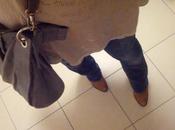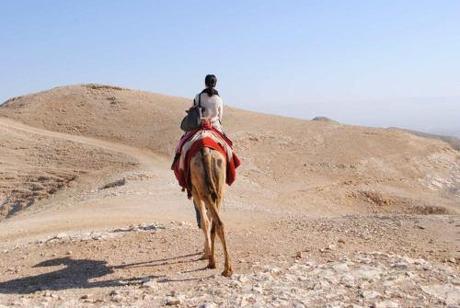
Me in Palestine – 2012
Dal 2008 ogni anno in Palestina ha luogo il PalFest, il Festival della Letteratura Palestinese promosso da personaggi prestigiosi come Harold Pinter ed Emma Thompson, nato per supportare la cultura di quella terra e di quel popolo sotto assedio.
“An annual, traveling cultural roadshow that crosses the military checkpoints keeping its audience divided“
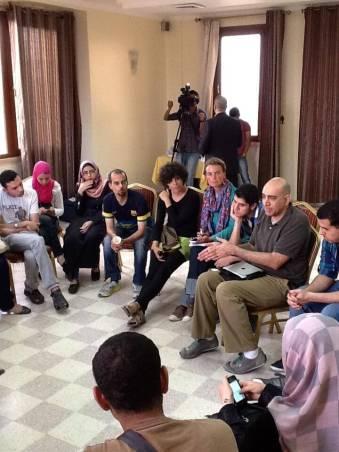

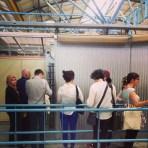
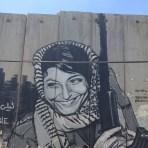
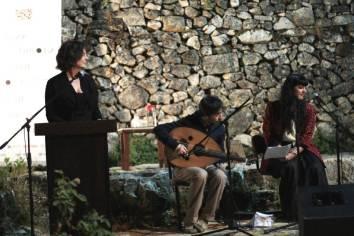
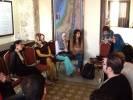
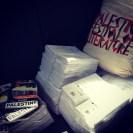
Lentamente, sottovoce, la letteratura ha cercato di ridisegnare un percorso, e di ridare voce a chi è stato derubato, sradicato, sterminato e messo a tacere.
In questi giorni leggo gli aggiornamenti dell’edizione 2013 su Facebook, e respiro l’atmosfera degli eventi attraverso i resoconti di Susan Abulhawa, la scrittrice che avevo intervistato l’anno scorso, poco prima di andare in Palestina.
Il PalFest ha luogo nelle meravigliose terre di Betlemme, Ramallah, Gerusalemme, Haifa, Nablus, e finalmente Gaza: un itinerario che attraversa anche i check-point, quei luoghi di cui anch’io ho sperimentato l’arroganza quando mi si negò l’autorizzazione a rientrare in Israele da Jerico.
Ancora una volta, la cultura è la risposta più bella e più efficace per l’identità, il dialogo, la rinascita.
Se non avete mai letto nulla di palestinese, vi consiglio “Ogni mattina a Jenin”, edito da Feltrinelli. E dato che il blog per il quale avevo intervistato Susan non esiste più, ripubblico qui il pezzo.
Con molto amore.

Il mio cuore per Susie
Morivo dalla voglia di scrivere questo pezzo. Io e Susie ci siamo rincorse per diverse settimane prima di riuscire a fare una chiacchierata in Skype da un capo all’altro dell’oceano, e prima che io riuscissi a guardare finalmente dritta negli occhi questa donna in esilio – bella come la sua terra – che ha scritto un libro straordinario.
Raramente mi piacciono i libri d’amore, ma “Ogni mattina a Jenin” racconta di amori talmente forti, talmente puri e talmente diversi tra loro che mi hanno stesa.
Susan Abulhawa oggi vive in Pennsylvania. Si è laureata anni fa in Scienze biomediche e ha avuto una brillante carriera nell’ambito della medicina. Ma arriva da lontano.
Quando le chiedo cosa significhi per lei la parola ‘casa’, mi risponde con un sorriso amaro: “Casa è prima di tutto mia figlia, e in generale dove mi sento circondata d’amore. Sono cittadina del mondo, ma in nessun luogo mi sento come mi sento in Palestina. Non so se è un sentimento che ha a che fare con le radici e con l’identità, oppure è semplicemente la necessità di giustizia che avverto per una terra che ha subito un trattamento così profondamente ingiusto.”
Susie è nata da una famiglia palestinese in fuga dopo la Guerra dei Sei giorni, e ha vissuto i suoi primi anni in un orfanotrofio di Gerusalemme. “In comune con Amal, la protagonista del libro, ho l’orfanotrofio, l’essere arrivata negli Stati Uniti da sola, e essere una madre single. E posso dire che Majid, il grande amore di Amal, è la trasposizione del mio ideale di uomo”
Majid, l’uomo alto, dall’aria stanca, con due occhi neri incastonati sotto sopracciglia arruffate.
“La Palestina era una terra multiculturale e multietnica – mi dice Susie – nella quale convivevano, fianco a fianco e in armonia, tutte le religioni e tutte le genti. È sempre stata una terra accogliente e generosa: ora non lo è più”
Nel libro si leggono parole lapidarie: “(..) l’indubbia, irrefutabile sicurezza palestinese di appartenere a questa terra. Mi possiede, indipendentemente da chi la conquista, perché il suo suolo è il custode delle mie radici, delle ossa dei miei antenati. Perché conosce i desideri segreti che hanno infiammato i letti delle mie progenitrici. Perché io sono il frutto naturale del suo passato ardente e burrascoso. Sono figlia di questa terra, e Gerusalemme mi rassicura di questo titolo inalienabile molto più degli atti di proprietà ingialliti, dei registri catastali ottomani, delle chiavi di ferro delle nostre case rubate, di tutte le risoluzioni o i decreti che potranno emanare l’Onu o le superpotenze”
Il libro racconta di una terra di cui ci si innamora, di una lingua che è come una danza, piena di benedizioni. Ma anche di storie strazianti che gonfiano la gola e mozzano il fiato, infilano il cuore nel tritacarne.
“Mia figlia non sente il richiamo della Palestina – continua a raccontarmi Susie – e purtroppo questo è una delle grandi piaghe della diaspora, dell’esilio: la perdita dell’identità, la scomparsa delle proprie origini dalle generazioni a seguire.”
Quando le domando cosa vorrebbe per il suo paese, mi risponde: “Personalmente non mi interessa la struttura politica, non ha importanza se ci saranno uno stato o due. Quello che mi sta a cuore sono i diritti umani: vorrei vedere la mia gente tornare a vivere con dignità, senza che ci siano più né oppressi né oppressori, in nome della religione o di qualsiasi altra cosa.”
Le volte che ha chiesto a suo padre di raccontarle com’è stato essere cacciati da casa loro solo con i vestiti che avevano indosso, quella mattina del 1967, lui ha sempre risposto atono, come raccontando la vita di qualcun altro: “Non c’è molto da dire: sono arrivati con i mitra, ci hanno detto di uscire e lasciare tutto, e noi l’abbiamo fatto.”
Da diversi anni, attraverso l’associazione Playgrounds for Palestine, Susan Abulhawa raccoglie fondi per costruire parchi nei Territori Occupati dove i bambini possano giocare. E scrive, continua a scrivere.
Secondo alcuni “Ogni mattina a Jenin” rappresenta per la Palestina quello che “Il cacciatore di aquiloni” rappresenta per l’Afghanistan. Ma siamo probabilmente oltre, perché nel libro di Susan la storia si incastra in modo talmente doloroso con il romanzo che le parole si fanno carne. Bombe. Siamo oltre l’emozione: siamo con le mani affogate nelle ferite aperte dei bambini rubati e delle donne sventrate. Assordati dal silenzio del mondo, ma pieni di un amore che speriamo non possa essere trovato più solo nelle pagine dei libri.
ENGLISH TRANSLATION
Since 2008, every year in Palestine the PalFest takes place: it’s the Palestinian Festival of Literature sponsored by prestigious personalities such as Harold Pinter and Emma Thompson, born to support the culture of that land and that people under siege.
“An annual, traveling cultural roadshow That crosses the military checkpoints keeping its audience divided”
Slowly, softly, the literature has sought to reshape a path, and to give a voice to those who have been robbed, eradicated, displaced, wiped out and silenced.
These days I read the 2013 edition updates on Facebook, and breath the atmosphere of events through the blog of Susan Abulhawa, the writer I interviewed last year, just before going to Palestine.
The PalFest takes place in the beautiful land of Bethlehem, Ramallah, Jerusalem, Haifa, Nablus, and finally Gaza : a route that also passes through check points, those places of which I also experienced the arrogance when I was denied the ‘authorization to return to Israel from Jerico.
Again, culture is the most beautiful and the most effective response to the identity, dialogue, rebirth.
If you have never read anything by Palestinian, I recommend “Every morning in Jenin”, published in Italy by Feltrinelli. And since the blog for which I interviewed Susan no longer exists, I republish it here.
With much love.
Susie in my heart
I was pining to write this post. Susie and I, we chased each other for several weeks before being able to chat in Skype, with an ocean between us, and before I could finally look straight in the eye of this woman in exile – as beautiful as her land – who has written an extraordinary book.
I rarely like love books, but “Every morning in Jenin” tells of a love so strong, so pure and so different that knocked me out.
Susan Abulhawa now lives in Pennsylvania. She graduated years ago in biomedical sciences and has had a successful career in medicine. But she comes from far away.
When I ask what does it mean, for her, the word ‘home’, she replies with a bitter smile: “Home is first and foremost my daughter, and generally where I am surrounded by love. I am a world citizen, but nowhere I feel like when I am in Palestine. I don’t know if it’s a feeling that has to do with roots and identity, or it’s simply because l’m seeking justice for a land that has been treated so terribly wrong. “
Susie was born in a Palestinian family on the run after the Six Day War, and lived her early years in an orphanage in Jerusalem. “In common with Amal, the main character of the book, I have the orphanage, being arrived in the United States all alone, and being a single mother. And I can say that Majid, Amal’s great love, is the transposition of my ideal man “
Majid, the tall man, with two tired-looking black eyes embedded with ruffled eyebrows.
“Palestine was a multicultural and multiethnic land – Susie tells me – in which all religions and all ethnic group co-existed side by side in harmony. It’s always been a welcoming and generous land that now no longer is”.
In the book you read lapidary words: “(..) the undeniable, irrefutable Palestinian security of belonging to this land. It possesses me, no matter who conquer it, because this land is the keeper of my roots, of the bones of my ancestors. Because it knows the secrets that have inflamed the beds of my ancestors. Because I am the natural fruit of its ardent and tumultuous past. I am the daughter of this land, and Jerusalem reassures me about this inalienable title a lot more than yellowed property acts, Ottoman Empire’s land registers, or our stolen houses’ iron keys, and more than all resolutions or ordinances which may be issued by the UN or superpowers “
The book tells of a land you fall in love with, a language that is like a dance, full of blessings. But also of harrowing stories that swell the throat and take the breath away, slipping your heart into meat grinder.
“My daughter does not feel the call of Palestine – Susie continues to tell me – and unfortunately this is one of the great plagues of diaspora, of exile: the identity loss, the origins disappearance in the generations to follow.”
When I ask what she dreams for her country, she replies: “The political construct does not matter to me. I don’t care if it’s a one state or two state. I care about human rights. I want to see Palestinians living, once again, in Palestine, with dignity and freedom; and without someone oppressing another because of religion or any other reason”
The times she’s asked her father to tell her how it was being knocked out from their homes with nothing more than the clothes they were wearing, that morning in 1967, he has always answered atonal, like telling about someone else’s life: “There isn’t much to say. They arrived with weapons pointed and told us to go out and leave everything: we did. “
For several years, through the association Playgrounds for Palestine, Susan Abulhawa raises funds to build playground in the Occupied Territories. And she writes, she continues to write.
Someone says that “Every morning in Jenin” is for Palestine what “The Kite Runner” is for Afghanistan. But we are probably beyond that, because in Susan’s book history gets stuck in the novel in such a painful way that words become flesh. Bombs. We are beyond emotions: our hands drowns in the open wounds of stolen children, in disemboweled women. Deafened by the silence of the world, but full of a love that we hope cannot be found only in books.


